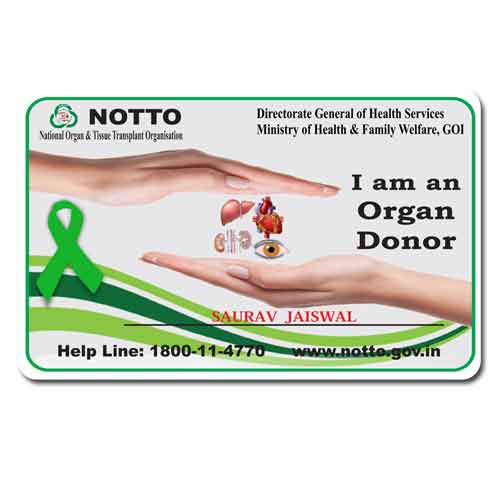Context:
The Union Health Ministry has mandated assigning a unique identification, NOTTO-ID, to all organ transplant cases in India.
More on the news:
- Hospitals are instructed to generate National Organ and Tissue Transplant Organisation (NOTTO)-ID for donors and recipients through the NOTTO website.
- NOTTO-ID is mandatory for organ allocation in case of a deceased donor. For living donor transplants, the ID must be generated within 48 hours after the surgery.
Objective:
- The move follows reports of malpractice and a surge in organ transplants related to foreigners in India.
- The directive aims to eliminate commercial dealing in organs, particularly those involving foreign citizens.
Monitoring:
- Regular inspection of registered hospitals for transplant/retrieval by the appropriate State authority is required.
- On-site monitoring of transplantation quality, post-operative follow-up of donor and recipient, and outcomes is mandated.
- States to ensure regular data sharing with NOTTO on a monthly basis on all transplant cases, including those involving foreigners.
- States and Union Territories are directed to ensure compliance with Appropriate Authorities investigating cases under the Transplantation of Human Organs and Tissues Act (THOTA), 1994.
Penalties:
- Violations of THOTA, 1994 may lead to thorough investigations and penalties, including suspension of hospital registrations.
Regulations for Foreign Nationals:
- For a foreign national, approval from the authorisation committee is necessary before organ or tissue removal or transplantation.
- A senior embassy official from the donor’s country of origin must certify the relationship between the donor and recipient using Form 21 of THOTA.
- In the absence of an embassy, the government of the donor’s country must issue the certification.
- The authorisation committee and senior embassy officials must assess and certify that the donation was made out of love and affection. There was no financial transaction between the recipient and donor and no pressure or coercion on the donor.
National Organ and Tissue Transplant Organisation (NOTTO)
- NOTTO is India’s national level body that promotes organ and tissue donation. It is established under the Transplantation of Human Organs (Amendment) Act 2011.
- It functions under the supervision of the Directorate General of Health Services, Ministry of Health and Family Welfare, Government of India.
It facilitates a robust transplant ecosystem by:
- Raising awareness
- Maintaining a national donor/recipient registry
- Overseeing ethical practices
- Supporting hospitals involved in transplants
Importance: NOTTO bridges the gap between organ demand and availability, offering a lifesaving option for those in need of a transplant.
THOTA
THOTA (Transplantation of Human Organs and Tissues Act) governs organ and tissue donation in India. Enacted in 1994, it aims to:
- Prevent commercialisation.
- Ensure ethical practices.
- Bridge the demand-availability gap.
Key Points:
- The act restricts organ removal to deceased donors (with consent) and living donors (close relatives).
- Mandates Authorization Committees to approve removals and transplants.
- Regulates hospitals involved in transplants.
- Establishes NOTTO for national coordination and awareness.
Significance:
- Promotes ethical organ donation.
- Sets standards for safe and transparent transplants.
- Saves lives by increasing availability for those in need.
Challenge: Low donation rates compared to developed nations.

